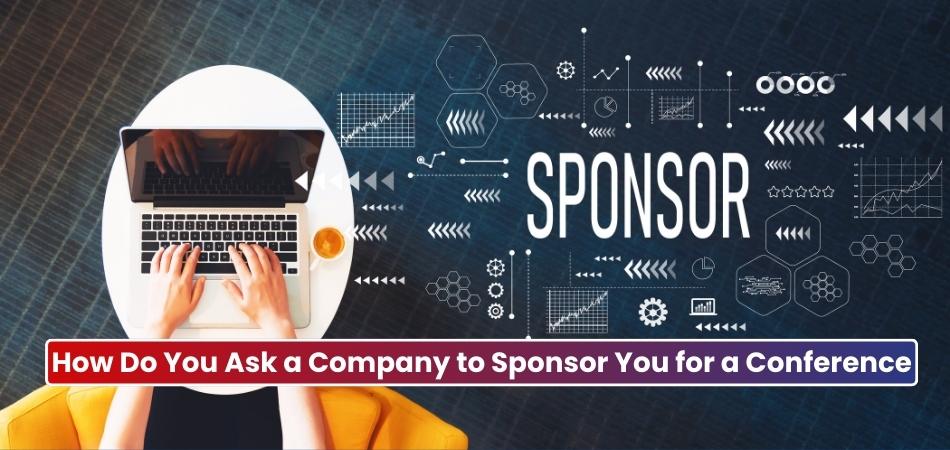Attending conferences can be expensive once you add up registration fees, travel, and accommodation. For many students and professionals, sponsorship makes the difference between attending and missing out. That’s why asking a company for support can be a smart step. So, how do you ask a company to sponsor you for a conference?
Ask by presenting a clear, professional request that highlights mutual value. Show how your attendance connects with the company’s goals, explain the benefits they gain from supporting you, and outline what you can offer in return, such as visibility, representation, or volunteering. A well-prepared request makes your chances of success much stronger.
If you’re ready to secure support, this article will walk you through the process step by step. Keep reading to learn how to draft your request, what details to include, and how to make your proposal stand out.
How Do You Ask a Company to Sponsor You for a Conference?
Getting a company to sponsor your conference trip can feel a little intimidating, but with the right approach, it’s more than possible. The key is to show how your attendance is valuable not only for you but also for the organization supporting you. Think of it as creating a win-win where you gain knowledge and connections, and they gain recognition and benefits. Step-by-Step Process:
Find the Right Sponsor
Start by identifying companies or organizations closely related to your field or conference theme. This could be your employer, a long-term business partner, or even a brand in your community if you’re wondering how to ask a business to sponsor you. Choosing the right sponsor ensures your request feels natural and mutually beneficial.
Do Your Homework
Before reaching out, research the company’s current initiatives and priorities. Look at their sponsorship history, recent campaigns, or community engagement projects. By showing you understand their goals, you make it easier to connect your request with what matters most to them right now.
Prepare a One-pager
Create a short document that summarizes the conference, your role, and the value for the sponsor. Include event details, costs, and clear deliverables you’ll provide in return. For example, if you’re applying to attend conferences in Canada, the USA, or the UK, highlight the global networking opportunities you’ll bring back.
Write a Simple Request Letter
Draft a clear, friendly letter that explains why you want to attend and how their support will help. Specify whether you’re asking for registration, travel, or full sponsorship. Be precise but not overwhelming; companies appreciate direct requests with transparent expectations.
Offer Options
Instead of only asking for full sponsorship, present different levels of support. For example, one option may cover your ticket, another may handle travel, and the top level covers everything. Giving options makes it easier for sponsors to say yes within their budget.
Follow Up Politely
Don’t assume silence means rejection. People are busy, and emails get buried. Wait a few days and send a polite reminder, showing you’re genuinely interested. A short, respectful follow-up often makes the difference between being ignored and getting a positive response.
Deliver on Your Promise
If a company agrees to sponsor you, keep your word. Share event notes, create a summary report, or acknowledge them publicly when appropriate. Following through builds trust and increases the chance that they’ll support you again in the future.
Sample Sponsorship Request Email
Here’s a simple example you can use if you’re unsure how to ask for a sponsorship email that feels polite, clear, and professional
Subject: Request for Sponsorship to Attend [Conference Name]
Hi [Name],
I hope you’re doing well. I’ve been accepted to attend [Conference Name] happening on [dates] in [location]. This event is a valuable chance for me to gain insights into [specific topics] and connect with leaders in the field.
The total cost is [amount], and I’m kindly requesting your sponsorship to help cover [specific cost: registration, travel, or full expenses]. In return, I’ll provide a detailed recap of sessions, highlight your support during networking, and prepare a short post-event report that can be shared within our team or network.
I’ve attached a one-page overview with the details. I’d be glad to discuss this further at your convenience.
Thank you for considering my request.
Best regards,
[Your Name]
Asking for sponsorship doesn’t have to feel awkward. Keep your request respectful, clear, and focused on mutual benefit. With the right preparation, you’ll increase your chances of getting support and building long-term professional relationships.
Why Does Conference Sponsorship Matter?
Getting sponsorship for a conference is about more than covering costs. It’s about creating chances to learn, connect, and grow in ways you might not manage on your own. With support, you can focus on making the most of the experience instead of worrying about expenses. Let’s explore the benefits in detail.
Financial Relief
Attending a conference often involves fees, travel, and accommodation, which can add up quickly. Sponsorship provides much-needed funding for conferences, taking away much of this pressure and letting you fully engage in the event without stressing over the financial side of things.
Access to Opportunities
A sponsor can give you access to areas you might not normally reach, like exclusive sessions, speaker meet-ups, or private networking spaces. For those attending abroad, international conference sponsorship can also make global networking possible.
Credibility Boost
Having a company or institution support your attendance shows others that you are worth investing in. This adds to your reputation, makes your profile stronger, and shows peers that your contribution matters in your field.
Skill Development
Sponsorship may allow you to attend extra workshops or specialized sessions. These learning opportunities often translate into practical skills you can take home and apply in real projects or academic work.
Wider Visibility
Sponsors sometimes highlight the people they support in their newsletters or social channels. This recognition adds visibility to your name, giving you more reach in your industry or academic community.
Confidence and Motivation
Knowing that an organization trusts your potential boosts your confidence. It motivates you to learn more, contribute actively, and represent yourself and your sponsor in the best way possible.
Long-term Relationships
Sponsorship doesn’t always stop at one event. When you deliver value, you create a relationship that can grow into ongoing support, collaborations, or even career opportunities later on.
So while financial help, access, and credibility are the main reasons sponsorship matters, the added benefits make it even more powerful. Sponsorship gives you tools, recognition, and relationships that last well beyond the event itself.
Benefits of Getting Sponsored for Attending a Conference
Securing sponsorship for a conference isn’t just about money; it’s about unlocking doors that can shape your growth and recognition. From covering costs to boosting your profile, the benefits are powerful. Exploring these conference sponsorship opportunities can help you see how support extends far beyond finances. Take a quick look at the table below to see them clearly.
| Benefit | What It Means for You | Example in Practice |
| Financial support | Helps cover registration, travel, and lodging so you can attend without worrying about expenses. | Students get sponsorship to cover airfare and ticket costs. |
| Networking access | Opens doors to VIP sessions and private meetups where real conversations happen. | Sponsored attendees join a speaker’s roundtable, usually closed to the general public. |
| Skill development | Lets you attend more sessions and workshops that build practical knowledge. | Young professionals join extra leadership workshops thanks to a sponsor’s support. |
| Visibility & credibility | Shows that an organization values your presence, boosting your professional standing. | Companies highlight their sponsored attendee in their LinkedIn post, giving extra recognition. |
Pairing this table with the full explanations gives your readers both quick takeaways and in-depth detail. It makes the section more engaging, SEO-friendly, and easy to skim, exactly the kind of balance Google rewards.
Negotiation & Follow-Up Tips
Asking for sponsorship doesn’t end once you send the first email. Following up with professionalism and patience is just as important as making the initial request. Knowing when to reach out and how to keep the tone respectful can make all the difference. Let’s walk through a simple timeline you can use.
- Day 0 – Send Your Request: Send a clear and well-prepared email along with your one-pager. Make sure your request is specific so the sponsor understands what you’re asking for and what they will gain in return.
- Day 3 – First Reminder: If you haven’t received a reply, send a short follow-up. Keep it polite and to the point, simply asking if they had a chance to review your proposal. This shows commitment without being pushy.
- Day 7 – Second Follow-up: If there’s still no response, follow up again with a little more detail. You can add a quick summary of the value for them or share how soon you need a decision. This keeps the conversation moving forward.
- Day 12 – Final Check-in: Your last message should be courteous and appreciative. Let them know you completely understand if they cannot move forward, but you’d still be glad to connect for future opportunities. Leaving the door open matters.
Negotiation and follow-up are about balance, being consistent without becoming overwhelming. Sticking to this simple timeline helps you stay professional and keeps sponsors engaged, while also showing them that you respect their time.
What Sponsors Expect in Return?
When a company agrees to sponsor your conference attendance, they naturally want to see what they gain from the support. It’s not only about covering costs, it’s about the value you bring back to them in return. Let’s go over the common expectations sponsors usually have.
Detailed Report
Sponsors want to know what you learned and how it connects to their goals. A short report summarizing sessions, key insights, and future applications shows them that their support was worthwhile and directly tied to results.
Presentation or Recap
Many sponsors appreciate a small presentation for their team or stakeholders. Sharing highlights, best practices, or new industry ideas in a meeting proves that you’re turning the conference experience into something that benefits the wider organization.
Social Media Mentions
Public acknowledgment goes a long way. A few LinkedIn posts, tweets, or photos thanking your sponsor during or after the event help boost their visibility and show gratitude in a simple, meaningful way.
Testimonial or Feedback
Some sponsors may ask for a testimonial that they can use on their website or internal reports. This creates a positive cycle, where your words also add credibility to their support of professional growth.
Post-event Report Template
Here’s a simple structure you can use for a sponsor report:
Title Page
- Event name, dates, your name, sponsor’s name/logo
Executive Summary
- 3–4 bullet points summarizing key takeaways
Sessions Attended
- List of sessions, workshops, or panels you joined
- Quick notes on their relevance
Key Learnings
- Main ideas you’ll apply in work, research, or projects
Sponsor Value
- How their support made your attendance possible
- Any visibility or acknowledgment they received
Next Steps
- Plans to share insights internally (presentation, training, notes)
- Suggestions for how this connects to upcoming goals
By preparing deliverables like reports, recaps, and public mentions, you not only meet sponsor expectations but also show professionalism. This approach makes them more likely to support you again for future events.
Common Mistakes to Avoid
When asking for conference sponsorship, many people miss out on opportunities because of simple but avoidable mistakes. A thoughtful approach can make the difference between a polite decline and a sponsor saying yes. Let’s look at the most common errors and how to avoid them.
Asking Too Vaguely
A general request like “Can you sponsor me?” won’t work. Be specific about what you need, such as registration fees or travel costs, and explain clearly how you’ll deliver value in return.
Forgetting to Show Mutual Value
Sponsorship is a two-way street. If you only talk about what you’ll gain, it feels one-sided. Always connect your attendance to the sponsor’s interests, whether it’s brand visibility, networking reach, or shared knowledge.
Not Following Up
Sending one email and waiting forever is a common mistake. People are busy, and messages get lost. A polite follow-up after a few days shows commitment and keeps the conversation moving.
Overloading With Irrelevant Info
Long-winded proposals full of unrelated details can overwhelm sponsors. Stick to the essentials: event details, costs, what you’ll deliver, and why it matters to them. Clarity always wins over bulk.
Using a Generic Template for Everyone
Copy-paste emails often sound impersonal. When writing a conference sponsorship letter, adapt your request to the specific company, referencing their goals or past initiatives. Personalization increases your chances of being noticed.
Being too Pushy or Demanding
Confidence is important, but being forceful can backfire. Sponsors appreciate respect for their decision-making process. Keep your tone polite, professional, and understanding.
Failing to Deliver After Sponsorship
Some attendees make the mistake of not reporting back. If you don’t provide updates or acknowledgments, sponsors will hesitate to support you again. Always fulfill your promises.
Avoiding these mistakes shows that you value both your sponsor’s time and trust. By keeping your request clear, respectful, and mutually beneficial, you raise your chances of success and build lasting relationships for future conferences.
Frequently Asked Questions
It’s normal to have a few more doubts after learning how to ask for sponsorship. Many attendees wonder about the finer details that aren’t always covered in guides. Here are answers to questions people often ask after exploring this topic.
How Early Should I Start Asking for Sponsorship?
It’s best to begin reaching out at least six to eight weeks before the conference. This gives the company time to review, approve budgets, and make arrangements. Starting early also shows you’re organized and serious.
Can I Ask More Than One Company for Sponsorship?
Yes, you can approach multiple sponsors, especially if one can’t cover the full amount. Just be transparent with each other about what you’re asking for. Some may offer partial support, which can still be helpful.
Should I Mention the Exact Amount of Support Needed?
Being clear with numbers is always a good idea. It helps the sponsor understand the cost and what part they can cover. Vague requests make it harder for them to decide quickly.
Is It Better to Send an Email or Make a Call First?
An email works well as the first step because it gives the sponsor something to review. A short follow-up call after a few days can add a personal touch. Combining both often gets better results.
What If a Company Declines My Sponsorship Request?
Don’t take a “no” personally, as budgets and priorities differ. Thank them for considering your request and keep the relationship positive. A polite response leaves the door open for future opportunities.
Do Sponsors Prefer Individuals or Groups?
It depends on the company’s goals. Some prefer sponsoring groups for a wider reach, while others may focus on supporting one strong individual who aligns with their interests. Either way, clarity and value matter most.
How Do I Show Gratitude to a Sponsor?
A simple thank-you letter or social media post goes a long way. Adding a small report or presentation shows extra effort. Sponsors value recognition because it confirms their support was meaningful.
Concluding Lines
Securing sponsorship can feel like a challenge at first, but once you understand the steps, it becomes much more manageable. The effort you put in now can create opportunities that stay with you long after the conference ends.
When people ask, How do you ask a company to sponsor you for a conference, the answer is simple: be clear, respectful, and always highlight the shared value. A thoughtful request backed by genuine commitment can make a big difference in the outcome.
Remember that sponsorship isn’t just about funding; it’s about building relationships that can benefit you and the sponsor in the future. Approach it with confidence, follow through on your promises, and you’ll be in a strong position for continued support.








